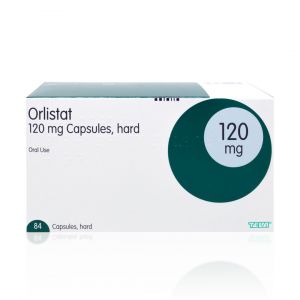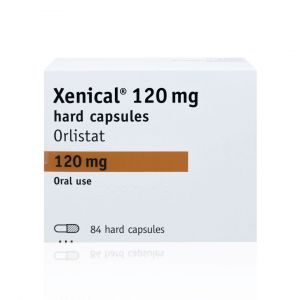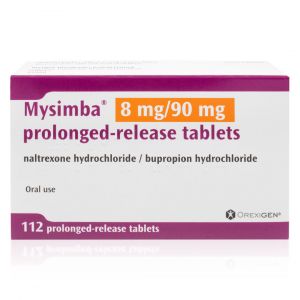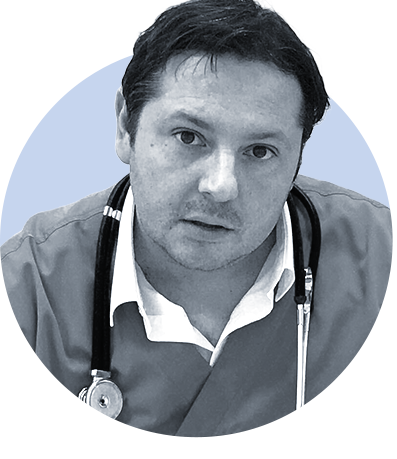If you are overweight or obese, you are at a higher risk from potentially fatal illnesses such as suffering a heart attack or stroke, having high blood pressure, high cholesterol, or diabetes. If you have a BMI of 30 or more, you should consider losing weight to reduce your risk of illness. However, some people struggle to lose weight without an aid. In which case you can buy weight loss tablets such as appetite suppressants to assist you in losing weight. They are a prescription medication that should only be taken under your doctor's supervision.
Weight loss pills and not a substitute for healthy lifestyle and should only be taken alongside a low-fat diet and whilst taking regular exercise. Your doctor can advise you on a sensible diet and the appropriate amount of exercise you should be taking. You may also choose to join a support group to be around like-minded people. It is more important to lose a small amount of weight each week, and keep it off, instead of doing a crash diet which may possibly have a rebound effect. You can buy weight loss medication from an online Doctor such as Doctor-4-U.
Below are some common Weight Loss medicines. Please note, this is not an exhaustive list and other non-medical methods may be more suitable. If you would like to learn more about these options, then please click here. Before receiving medication you must answer a number of questions to asses your suitability. All questions are reviewed by a GMC registered doctor before a final decision is made. All medication is dispensed via a full regulated and registered UK pharmacy. All medication is dispensed via a full regulated and registered UK pharmacy. All prices displayed on our site include the price of the medication and our doctors consultation fee.
Weight Loss
What is a healthy weight?
There are no hard and fast rules for what is or isn’t a healthy weight. Your own healthy weight will depend on factors such as your gender, height, age, and even ethnicity. Other factors, such as the amount of exercise you do, can also play a factor. There are online tools to help you find out if you are in a healthy weight bracket, but if you are concerned, you should take advice from a doctor as they are not necessarily a hundred per cent reliable. You should not be worrying about your weight when you are pregnant, as not eating a full diet may starve your baby of nutrients and put the foetus at risk of birth defects or difficulties later on in its life. There are also certain illness which may make you keep on weight. If you are having difficulty losing weight, speak to your GP and they can give you assistance.
How do I find out if I am a healthy weight?
The most popular way to easily work out if you are overweight is by using an online tool called a BMI calculator. BMI stands for Body Mass Index, and the score is calculated by dividing an adult’s weight in kilograms by their height squared. Although it is a somewhat rudimentary tool as it does not take a wholistic look at a person’s lifestyle, it can give a rough “at a glance” guide to your health. Below are the weight ranges for health levels based on your BMI
- Underweight - a BMI of under 18.5
- Healthy weight - a BMI of 18.5 to 24.9
- Overweight - a BMI of 25 to 29.9
- Obese - a BMI of 30 or more
If your BMI is over 30 and you know there are no factors making it abnormally high, you should speak to your doctor about getting help to lose weight.
What inaccuracies does the BMI score have?
If you search the internet, you’ll find no shortage of articles explaining how BMI is an imperfect tool, which to an extent, it is. That doesn’t mean it should be dismissed, as it can be a good indicator of if you need to lose weight (or put weight on), but here are some of the caveats to the accuracy of BMI:
- It does not factor in waist size, a key indicator of obesity. Where you carry the fat (and therefore the type of fat you have) can affect the health problems you may encounter
- It does not account for the fact that muscle and bone are far more dense than fat. This means that heavyweight boxers, professional athletes, and celebrities who keep in shape would be classed as overweight or obese even when they are definitely not
- It can be demoralising and demotivating as it reduces people to a number. This is especially relevant if you are trying to lose weight, and whilst your are burning fat, you are putting on muscle and although you are getting healthier, the number doesn’t appear to change
- It doesn’t measure the percentage of fat you carry, and you may fall into the healthy weight range but be carrying too much fat
- It doesn’t account for ethnic group - some people from Asian backgrounds are at risk of developing obesity related illnesses when their BMI is lower is the western definition of obese
However, no one is suggesting you use BMI as a hard line by which to measure yourself and make health decisions, your doctor can advise you if you need to lose weight.
What are illnesses that make you keep on weight?
For some people, losing weight may be harder or even impossible if you have an illness which is causing you to put on weight, or keep it on. These illnesses include:
- Hypothyroidism, or an under active thyroid. The thyroid is a butterfly shaped gland in your neck which is responsible for releasing a hormone designed to regulate your metabolism. If your thyroid is under active, and not enough of the hormone is released, you will find yourself fighting an uphill battle to lose weight
- Diabetes. Diabetes is a problem relating to your blood sugar levels, and many people with long term diabetes get into the habit of snacking more than most, as a way to prevent hypoglycaemia, also known as low blood sugar levels
- Cushing’s syndrome. This very rare illness is caused by high levels of the hormone cortisol, which can make you gain weight on your face and in the abdominal region
- Stress, anxiety and depression. Mental health problems affect sufferers in different ways, and some people find they actually lose weight when their mental health is low, but others eat for comfort, which can mean they put on weight
- Insomnia. There is a link between not getting enough sleep and gaining excess weight. This is thought to be because when you don’t get enough sleep, your hunger hormones are raised, and the hormones that tell you you’ve had enough to eat drop. In short, it can leave you wanting to eat more than you need to
- Fluid retention. If your body is storing more fluid than is necessary, it will understandably mean you put on weight because of it. Some types of fluid retention, also known as oedema, are relatively normal and to be expected, such as if you’ve been standing for a long period of time, or are pre-menstrual. However some kinds of fluid retention are not so straight forward and can be dangerous. If you have swollen ankles, keep needing to pee during the night, or have to sleep on several pillows to avoid feeling breathless, this could be indicative of a problem with your kidney or liver and you should see a doctor to discuss your symptoms
- Polycystic ovary syndrome (PCOS). This is a common condition that affects the function of a woman’s ovaries, and has symptoms such as irregular periods, difficulty getting pregnant, excess hair, weight gain. Unfortunately, the more weight you gain, the more insulin you produce, which may cause further weight gain - it can be a very tricky cycle to leave. You may choose to use a weight loss aid if your weight is due to PCOS.
There are also some medications which have the side effect of weight gain, including:
- The contraceptive pill. As the pill relies on manipulating the body’s hormones as its way of taking effect, it can also play with your metabolism and hormones which control your appetite
- Antidepressants. SSRIs, medically known as selective serotonin reuptake inhibitors, can alter how your brain feels about eating and change your appetite
- Beta blockers. There are all kinds of reasons you might be taking beta blockers, as they are a drug which slows the speed and ferocity with which the heart beats and are therefore taken for all sorts of problems, from high blood pressure or chest pain (angina) to migraine or situational anxiety prevention. Beta blockers may mean you put on weight because with a reduced heart rate comes reduced metabolism
- Steroids. Corticosteroids, which can be taken to treat all kinds of illnesses from asthma to arthritis, can disrupt the hunger and satisfaction areas of the brain and leave you wanting to eat far more than you need to
What are the dangers of being overweight?
Being overweight or obese can lead to all kinds of long term health problems which in some cases can have potentially fatal consequences. These include:
- Type 2 diabetes
- Suffering from a stroke or heart attack
- Coronary heart disease
- Some types of cancer
- High blood pressure and high cholesterol
- Asthma
- Metabolic syndrome (a combination of diabetes, high blood pressure and obesity)
- Sleep apnoea (where you stop breathing for short periods of time in your sleep)
- Liver and kidney disease
- Reduced fertility and a higher risk of pregnancy complications
Many people also experience problems with depression, anxiety and self esteem because of how they feel about their weight, which can lead to consequences of their own.
What are the benefits of losing weight?
As you lose weight, your risk of developing the long term illnesses listed above will decrease, but you will also notice day to benefits in your life. Exercising will get easier and more enjoyable, and you’ll be able to play some sports you couldn’t before, or run for a bus without embarrassment. You should find sleeping easier, and any mental health condition associated with your weight should ease up. Many people find themselves to be more confident and happy in themselves once they have reached a weight goal, or are in the BMI definition of healthy. You also reduce the risk of suffering from joint pain, and in later life, pain or discomfort that will restrict your movements and by extension, limit your lifestyle.
How should I lose weight?
If you are concerned about your weight and want to lose some, you should speak to your GP. They will be able to give you help and advice as to the best way for you to lose weight, be it reducing the food you eat, changing your diet, or increasing the amount of exercise you take. You should stay clear of diets you find online or in magazines which promise to help you lose a lot of weight very quickly as these can lead to the effects rebounding and you putting the weight you lost, or sometimes, more than you lost, back on. Instead, you should opt for a diet where you lose weight gradually, with the intention of keeping it off, as this will be far more beneficial and good for you in the long term.
What do I do if I am struggling to lose weight?
Losing weight can be a difficult and slow process, and especially if you are putting on muscle as you burn fat, it can be hard to notice a difference. This is because, even day to day, the difference will be so small that you might not see it. When you begin losing weight, take a “before” picture, to remind yourself how far you’ve come.
You may want to join a dieting or support group to be around like-minded individuals and receive their support. Dieting can be a lonely experience, especially if you are the only one in a group of friends doing so. It can be difficult to turn down invitations to calorie heavy events like going out for a meal or cocktails, so making friends with people who are in the same boat as you can be a very postive approach.
There are also weight loss aids you can use to help you lose weight. These are especially useful if you are suffering from an illness which makes it harder for you to lose weight, but should only be used if your BMI is over 30, or over 27 and you have other weight related complications such as diabetes. You should not use weight loss aids in you are healthy or underweight as it can be very dangerous to your health and wellbeing. They can come in the form of tablets such as Orlistat or Mysimba, or injections such as Sexanda. When you have taken advice from your doctor, you can buy weight loss aids such as these from Doctor-4-U.























